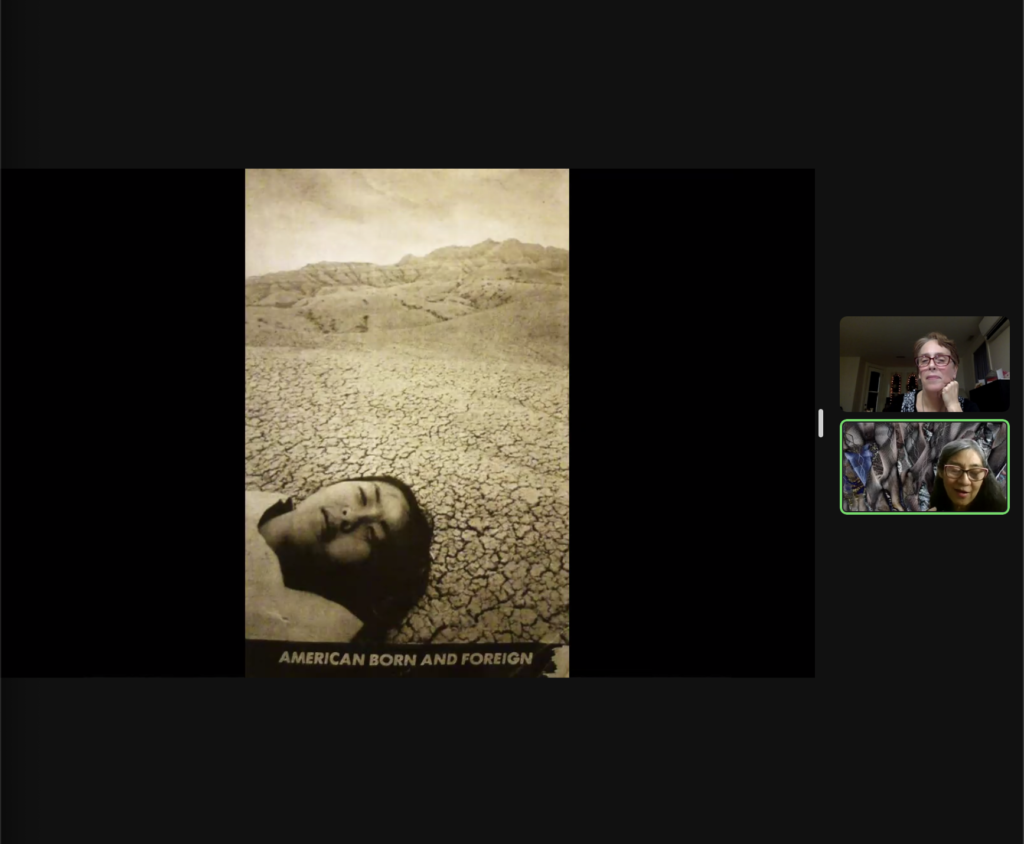by Amanda Bang, AsAmNews Staff Writer
When Nina Kuo, a Chinese American multimedia artist, was given a choice of where to spend her time working through Comprehensive Employment and Training Act in the 1970s, she chose the Basement Workshop, intrigued by their first exhibition of its kind exploring the history of the Chinese Americans, “Images of a Neglected Past: The Work and Culture of Chinese in America.”
CETA was a law enacted in 1973 during the Nixon registration. It was intended to train workers and provide them with jobs in the community. This grant impacted the arts heavily, not only providing training and jobs for these artists, but also initiating a program that employed these artists to serve the community through murals, performances and more.
Kuo discussed her experience with CETA during the CETA and the Feminist Art Movement panel discussion, which was held over Zoom on Wednesday. The panel’s speakers explicated and celebrated how this grant, focused on equity, especially helped women in arts.
Many of the panelists, such as Arlene Rakoncay, President of the Chicago WCA and former Director of the Chicago Artists’ Coalition, spoke about how the grant worked to help underrepresented groups at that time.
“It gave artists a chance to work and have a salary,” Rakoncay said.
She also shared CETA helped them give resources to other artists to start their journey into professional art, and and those women artists and artist of color were heavily impacted by the grant.
Kuo said CETA helped represent Asian American culture and arts, especially with Basement Workshop she worked with.
“It was a way that Asian Americans… really merged our forces, and it was a really selfless, moments of, years of fighting deadlines, low budgets,” Kuo said during her panel presentation. “We were really out to just fight against all the struggles.”
She added that the Basement Workshop provided artists with different forms of presentation, such as performances, music studios, active poetry and writing groups.
Kuo shared some of the works she created at her time with Basement Workshop.
“I wanted to show how I felt like an embryo coming out of the American West,” she said, describing her artwork.
Kuo also presented “Adopt a Building” photo documentation, another project she worked on from the funded studio. She said collecting these photos of abandoned buildings inspired her personal project documenting disappearing “ethnic” buildings that had remnants of Asian heritage.
“I would scour around and see these funky storefronts with ethnic mom and pops that were totally disappearing,” Kuo said. “So with this fascinating architecture, I was able to kind of see myself as a composer of the gestures of these given spaces.”
Over time, she was able to collect enough photographs to put on exhibit, which gained publicity as Village Voice put out a review. Through CETA and Basement Workshop, her work relating back to her Asian roots was able to garner public notice.
The panel discussion also presented that CETA helped bring many resources to artists at the time. Rakoncay said the finding provided them with typewriters, more workers, and programs helping artists to jumpstart their career.
Another speaker Maren Hassinger said CETA gave her, a black artist, a first real professional opportunity.
Kuo shared what her colleague had said about CETA’s impact on Asian American artists to close her panel presentation.
“A colleague of mine said years ago, we were thought of as not on the menu but actually with CETA, we are on the menu,” Kuo said. “I think that CETA was a catalyst for new frontiers that link many art groups and the demands of the future. I think that CETA lives on through our work.”
AsAmNews has Asian America in its heart. We’re an all-volunteer effort of dedicated staff and interns. Check out our new Instagram account. Go to our Twitter feed and Facebook page for more content. Please consider interning, joining our staff, or submitting a story, or making a contribution.


Thank you Nina! Your voice, experiences, reflections and insight ..so appreciated.